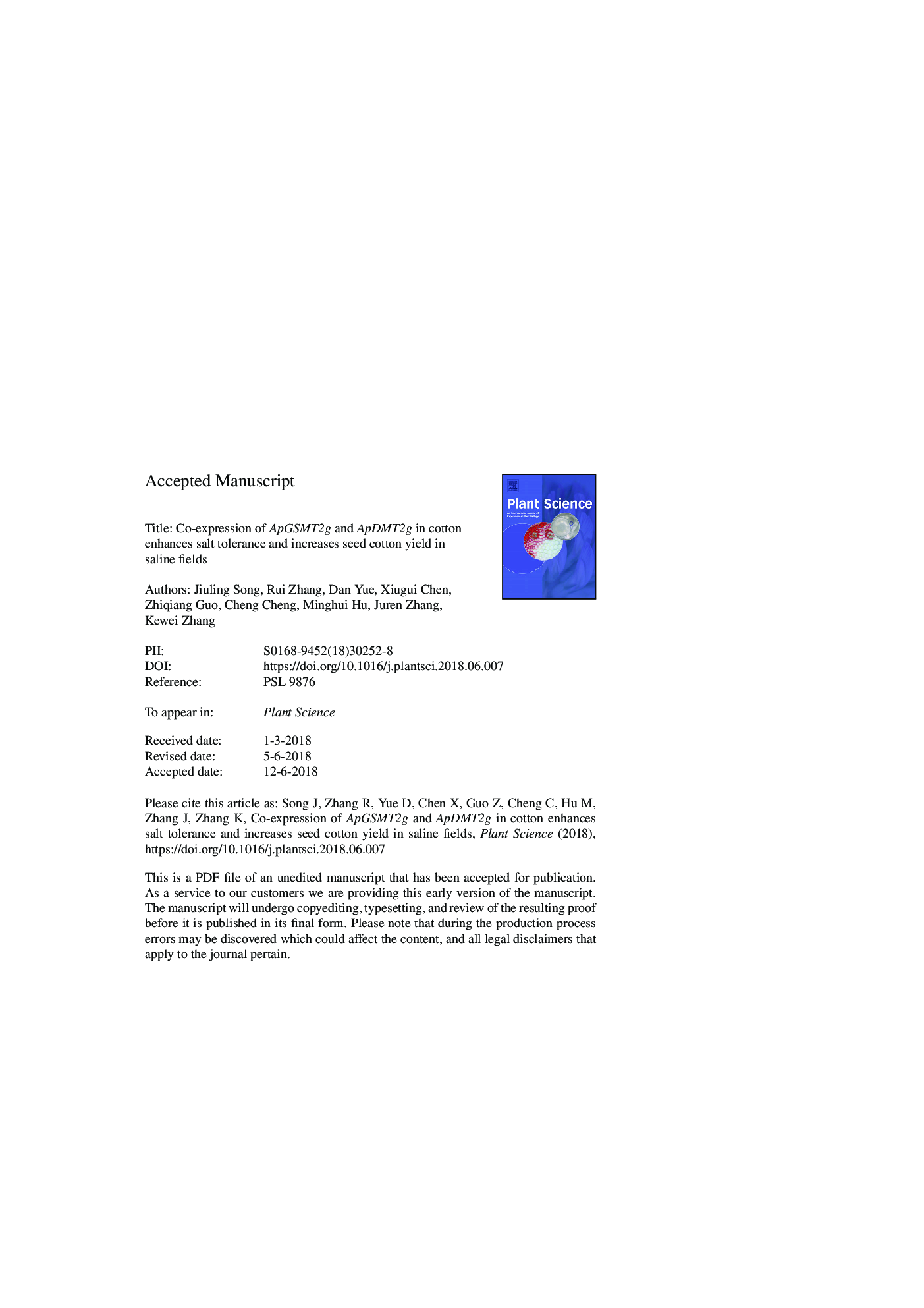| کد مقاله | کد نشریه | سال انتشار | مقاله انگلیسی | نسخه تمام متن |
|---|---|---|---|---|
| 8356369 | 1542015 | 2018 | 38 صفحه PDF | دانلود رایگان |
عنوان انگلیسی مقاله ISI
Co-expression of ApGSMT2g and ApDMT2g in cotton enhances salt tolerance and increases seed cotton yield in saline fields
دانلود مقاله + سفارش ترجمه
دانلود مقاله ISI انگلیسی
رایگان برای ایرانیان
کلمات کلیدی
φEoφPoMDASDMTCMOΦPSIIRWCFv/Fm - Fv / FmCDH - HRCBADH - بادهbetaine aldehyde dehydrogenase - بتائین آلدئید دهیدروژنازCo-expression - بیان مشترکSalt stress - تنش شوریSOD - سدSuperoxide dismutase - سوکسوکس دیسموتازSeed cotton yield - عملکرد دانه دانهmalondialdehyde - مالون دی آلدهیدRelative water content - محتوای آب نسبیwild type - نوع وحشیCod - کادوCotton - کتانhigh-performance liquid chromatography - کروماتوگرافی مایعی کاراHPLC - کروماتوگرافی مایعی کاراcholine oxidase - کولین اکسیدازCholine dehydrogenase - کولین دهیدروژنازCholine monooxygenase - کولین مونوکسینژازGlycine betaine - گلیسین بتائین
موضوعات مرتبط
علوم زیستی و بیوفناوری
علوم کشاورزی و بیولوژیک
دانش گیاه شناسی
پیش نمایش صفحه اول مقاله

چکیده انگلیسی
Salinity is a major factor limiting plant growth and agricultural production worldwide. Glycine betaine (GB) is one of the most universal osmoprotectants that protects plants from environmental stresses. In this study, transgenic cotton co-expressing ApGSMT2g and ApDMT2g was generated by Agrobacterium-mediated transformation. Compared with wild-type (WT), co-expression of ApGSMT2g and ApDMT2g in cotton results in higher GB amounts, higher relative water content (RWC), lower osmotic potential, more K+, and less Na+ under salt stress, which contributes to maintaining intracellular osmoregulation and K+/Na+ homeostasis and thus confers higher salt tolerance and more vigorous growth. Furthermore, co-expressing ApGSMT2g and ApDMT2g in cotton leads to better performance of PSII, greater photosynthesis capacity, and finally, improves plant growth and increases cotton seed yield compared to WT under salt stress. The reason for the better performance of PSII in transgenic cotton is the higher quantum yield and a more reasonable quantum ratio distribution than WT under salt stress. Co-expressing ApGSMT2g and ApDMT2g in cotton also reduces membrane damage and increases superoxide dismutase (SOD) activity compared to WT under salt stress. Our results indicate that transgenic ApGSMT2g and ApDMT2g cotton shows higher salt tolerance and more seed cotton yield in saline fields compared to wild-type.
ناشر
Database: Elsevier - ScienceDirect (ساینس دایرکت)
Journal: Plant Science - Volume 274, September 2018, Pages 369-382
Journal: Plant Science - Volume 274, September 2018, Pages 369-382
نویسندگان
Jiuling Song, Rui Zhang, Dan Yue, Xiugui Chen, Zhiqiang Guo, Cheng Cheng, Minghui Hu, Juren Zhang, Kewei Zhang,